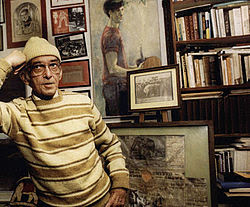Stringfellow: Theologian of Freedom
This year I plan to blog a bit about one of my major theological interests and influences: The writings of William Stringfellow (1928-1985). Stringfellow was an Episcopal attorney, activist and theologian who was a major prophetic voice within North American Christianity from the post World War II era into the Reagan years, though his was often a marginal voice in relation to the churches and the academy. I will look at some key passages from his work in the hope of enticing you, gentle readers, into exploring his life and legacy for yourselves. But I want to start with a little teaser from Stringfellow's most famous advocate.
In the forward to his Evangelical Theology, Karl Barth recaps his tour of the United States earlier that year. Among such worthies as Billy Graham and Martin Luther King Jr., Barth singles out "the thoughtful and conscientious William Stringfellow, who caught my attention more than any other person" (p. ix, emphasis mine). Stringfellow was close friends with Barth's son, Marcus, the New Testament scholar, and through this contact the young lawyer was able to make several connections between the Swiss theologian and a few folks in the States. Stringfellow helped to bring Barth to East Harlem, where the young activist had practiced law, and also helped set up a tour of the Riker's Island jail (See Dancer, pp. 169-171). Stringfellow famously stole the show as one of the interlocutors at Barth's panel discussion at the University of Chicago (stay tuned for more about this).
As I approach Stringfellow's work, I like to remember the famous admonition Barth gave to his American readers:
I don't mean to suggest that Stringfellow is the "child of promise"; in fact, I don't believe there ever has been or ever will be such a person, neither in the United States, Germany, Switzerland, Rome nor anywhere else. I mean rather to propose that the young theologian and troublemaker may have caught more than a whiff of that spirit of freedom to which Barth was pointing -- the freedom that the children of God have in Christ Jesus.
Sources:
Barth, Karl, Evangelical Theology: An Introduction (New York: Holt, Rinehart & Winston, 1962).
Dancer, Anthony, An Alien in a Strange Land: Theology in the Life of William Stringfellow (Eugene, OR: Wiph & Stock, 2011).
==================================
Follow @@jsjackson15
In the forward to his Evangelical Theology, Karl Barth recaps his tour of the United States earlier that year. Among such worthies as Billy Graham and Martin Luther King Jr., Barth singles out "the thoughtful and conscientious William Stringfellow, who caught my attention more than any other person" (p. ix, emphasis mine). Stringfellow was close friends with Barth's son, Marcus, the New Testament scholar, and through this contact the young lawyer was able to make several connections between the Swiss theologian and a few folks in the States. Stringfellow helped to bring Barth to East Harlem, where the young activist had practiced law, and also helped set up a tour of the Riker's Island jail (See Dancer, pp. 169-171). Stringfellow famously stole the show as one of the interlocutors at Barth's panel discussion at the University of Chicago (stay tuned for more about this).
As I approach Stringfellow's work, I like to remember the famous admonition Barth gave to his American readers:
What we need on this and the other side of the Atlantic is not Thomism, Lutheranism, Calvinism, orthodoxy, religionism, existentialism, nor is it a return to Harnack and Troeltsch (and least of all is it "Barthianism"!). but what I somewhat cryptically called in my little final speech at Chicago a "theology of freedom" that looks ahead and strives forward (p. xii).
I don't mean to suggest that Stringfellow is the "child of promise"; in fact, I don't believe there ever has been or ever will be such a person, neither in the United States, Germany, Switzerland, Rome nor anywhere else. I mean rather to propose that the young theologian and troublemaker may have caught more than a whiff of that spirit of freedom to which Barth was pointing -- the freedom that the children of God have in Christ Jesus.
Sources:
Barth, Karl, Evangelical Theology: An Introduction (New York: Holt, Rinehart & Winston, 1962).
Dancer, Anthony, An Alien in a Strange Land: Theology in the Life of William Stringfellow (Eugene, OR: Wiph & Stock, 2011).
==================================
Follow @@jsjackson15


Comments